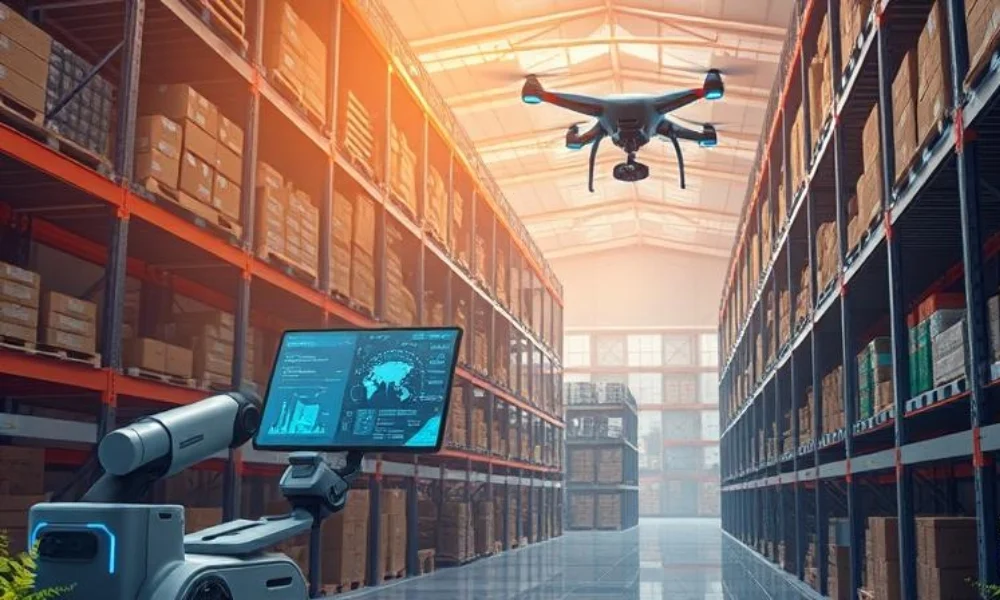Artificial Intelligence
How Does AI Improve Inventory Management?
AI is transforming inventory management with precise demand forecasting, task automation, and enhanced supply chain decisions. Boost efficiency, reduce waste, and increase customer satisfaction by leveraging AI. Stay ahead in the competitive market with smart AI solutions!

Businesses have traditionally encountered difficulties when managing inventory which consumes a lot of their operational time. Businesses face the common problems of inventory excess and empty stockrooms as well as unclear inventory status. Inefficient inventory management results in business losses together with wasted resources and unfulfilled market potential.
A smarter approach exists to control inventory through artificial intelligence. Enter artificial intelligence (AI). Businesses now solve their inventory management problems effectively because AI improve inventory management brings both enhanced accuracy and lower operational costs as well as operational speed improvements.
Definition:
AI in inventory management refers to the use of cutting-edge machine learning, automation, and data analysis tools to track inventory, forecast demand, and streamline processes in ways that humans cannot.
AI inventory management systems use machine learning together with advanced analytics as computational tools to operate. Advanced systems process data to make better choices through organization and data collection functions.
Real-time solutions emerge from automated stock tracking combined with order predictions and supply chain optimization when human errors get eliminated.
These operations benefit from AI implementation through better and faster performance. AI enables quick business responses to sudden events that include unexpected increases in demand alongside supplier delays.
The article explores how AI creates fundamental changes to demand forecasting processes and enables complete automation of inventory management as well as offers warehouse optimization and supply chain enhancement while providing several cost reduction benefits. At the conclusion you will grasp that AI represents the essential requirement for inventory management systems of the future. Let’s get started!
Why Is Inventory Management Important:
The success of businesses depends heavily on proper inventory management to reach operational excellence and contented customers. Its importance stems from the multiple reasons listed below:
- Reduces Costs: Cost of holding excess inventory rises when you stock too much while understocking products results in revenue loss. AI algorithms help organizations strike the proper inventory equilibrium.
- Prevents Stockouts: Predictable restocking methods enable businesses to prevent product shortages of their best-selling items.
- Enhances Fulfillment: A quick delivery process produces happy clients who become dedicated to the brand.
- Improves Cash Flow: Businesses that hold optimal inventory amounts free trapped capital which becomes available to fund their operational requirements.
- Boosts Efficiency: Better inventory systems eliminate human mistakes and cut down processing time so staff members can dedicate their efforts to essential duties.
- Minimizes Waste: A system for tracking inventory prevents product spoilage, product expiration, and unnecessary production of stock which results in sustainable operations.
- Strengthens Customer Trust: Reliable order fulfillment with precise accuracy and punctuality creates trustworthy business relationships which generates future customer business and lasting relationships.
Businesses that implement effective inventory management achieve money savings in addition to increased operational success.
How Does AI Automate Inventory Tracking?
Advanced tracking tools consisting of RFID tags and IoT sensors and computer vision operate under AI to perform automatic inventory monitoring. Real-time stock updates provided by automated systems eliminate all possibilities of human-based errors.
AI-powered smart systems have the ability to self-identify misplaced warehouse items. An AI-equipped warehouse can deploy surveillance cameras to instantly detect inventory flaws which results in simultaneous savings of time and financial resources.
Can AI Reduce Overstock and Stockouts?
The combination of excessive stock and inventory shortage creates problems because overstocking drives unnecessary storage expenses yet stockouts generate both revenue loss and customer dissatisfaction. The real-time inventory optimization capabilities of AI resolve both problems of overstock and stockout through schedules optimization and continuous balance control.
An AI system installed at a retail chain resulted in a 30% decrease of stockouts throughout the course of one year. Modern technology provides businesses with their most accurate and simplest approach to deliver products when they are needed.
AI and Warehouse Optimization: How Does It Improve Efficiency?
Warehouses experience a revolutionary transformation through AI which provides both automated functionalities and efficient computing methods. The implementation of AI technology results in better warehouse operational efficiency through three specific methods.
- AI-Powered Robots: System helps distribute items for packing and sorting operations to enhance order fulfillment speed.
- Smart Storage: Most effective item storage areas are determined through routing algorithms which minimize item retrieval duration.
- Automated Inventory Tracking: Real-time inventory tracking by AI systems helps prevent both the problems of overstocking and stockout occurrences. Warehouse accuracy enhances through automation which lets facilities keep track of their inventory details and handle changing customer demands effectively.
- Predictive Maintenance: Analysis of equipment performance by AI systems generates maintenance predictions before operational problems occur. Machinery life expectancy increases because of this process which reduces operational downtime and keeps warehouses from facing expensive maintenance expenses and operational interruptions.
- Efficient Route Planning: Implementation of AI-driven routes enables better selection of the fastest warehouse delivery paths. The streamlined travel paths between workers and robots cut down operational time for order completion while decreasing energy requirements.
- Real-Time Data Analytics: AI incorporates multiple data sources for real-time analysis which provides immediate solutions for decision-making. The collection of real-time data enables managers to obtain valuable information which helps them optimize inventory management as well as improve workforce distribution and workflow processes to achieve maximal efficiency.
- Enhanced Worker Productivity: AI-based automation systems together with AI-powered tools effectively raise employee performance levels.
Amazon implements AI technology to operate robots that help speed up order processing by moving products through their system efficiently.
How Does AI Enhance Supply Chain Decision-Making?
AI contributes extensively to supply chain management by processing information about supplier outcomes alongside delivery period duration alongside anticipated interruption events.
Analysis of unexpected supplier disruptions or worldwide crises by AI systems enables it to suggest backup suppliers while foreseeing the resulting delivery timeframe effects. Multiple businesses implemented AI systems to modify their supply chain operations throughout the COVID-19 disruptions which maintained the availability of vital products.
What Are the Cost-Saving Benefits of AI in Inventory Management?
The implementation of AI produces two main benefits which include both operational efficiency and substantial cost reduction. Some examples include:
- Reduced Labor Costs: Automation process removes the need for human workers to perform repetitive work such as physical inventory verification.
- Lower Holding Costs: When stock quantities are optimized there will be fewer products remaining unused in storage facilities.
- Preventing Losses: Detection of expired or obsolete inventory products helps to eliminate waste.
- Minimized Overstocking: Businesses which rely on AI predictions for ordering only get the necessary amounts of stock thus avoiding expensive unused inventory.
- Optimized Order Management: Artificial intelligence enhances order management through real-time data analysis to ensure both perfect stock levels and on-time inventory restocking which prevents product shortages and excess stock.
- Reduced Shipping Expenses: Implementation of advanced algorithms leads to shipping consolidation which selects the most economic delivery methods and enhances overall operational productivity and reduces transportation costs.
- Improved Supplier Negotiations: AI generates deep analytics which enable enterprises to access supplier performances and market trends thus obtaining superior terms while revising prices during negotiation periods.
AI generates financial value for companies when it saves costs that directly appear in their profit and loss statement.
What Are the Challenges of Implementing AI in Inventory Management?
The implementation of AI receives substantial benefits that people can harness yet it creates execution hurdles. The adoption of AI by businesses brings forth these main barriers to implementation:
- High Initial Costs: Businesses need to allocate substantial money before implementing AI technologies.
- Expertise Required: Businesses need experts to handle the effective operation of their AI systems.
- Data Privacy Concerns: Businesses need to establish procedures which verify that their AI applications adhere to data protection legislation.
- Integration Complexity: The integration of AI systems with current operations proves to be a complicated task. Avoiding implementation delays requires expertise to create custom solutions between new and old systems and it needs extreme technical competence for compatibility.
- Resistance to Change: Employees together with stakeholders sometimes avoid adopting AI solutions because they believe automation will take over their work or force significant modifications to their work processes.
- System Downtime Risks: Implementation of new AI systems combined with testing phases may introduce operational interruptions that could lead to financial losses when proper management methods are not applied.
- Continuous Maintenance Needs: Continued maintenance of AI systems remains essential because they need regular system updates together with a combination of machine testing and troubleshooting to adapt to new business demands or emerging technologies.
Financial advantages of investment typically deliver better results than the initial implementation hurdles in future timeframes.
Future of AI in Inventory Management: What’s Next?
AI’s future in inventory management is bright and rapidly evolving. Here’s what’s next:
- Integration with Blockchain: AI systems will unite with blockchain technology for highly secured and transparent inventory management through secure networks.
- AI Chatbots for Inventory Queries: Business operations will implement AI-driven chat platforms that answer stock inquiries in real-time.
- Even Smarter Predictions: Software that uses big data will enable AI to become more accurate than ever when generating forecasts.
- Autonomous Warehouses: AI-powered robotics will bring autonomous warehouses to the market because these warehouses operate independently with no human workers required to do sorting packing and shipping tasks thus improving speed and precision.
- IoT-Enabled Tracking: Real-time tracking and precise inventory accuracy together with accelerated decision-making will emerge from IoT device incorporation with AI technology into inventory management operations.
- AI-Driven Supply Chain Optimization: AI-powered systems examine extended supply chain information to find operational weaknesses and enhance interactions between suppliers and distributors thus minimizing expenses and expedite deliveries.
- Enhanced Personalization in Inventory Management: AI enables businesses to develop customized inventory strategies by using customer data thus they can deliver personalized stock levels which leads to better customer satisfaction.
Continuous development of AI technology makes its essential role for inventory management stronger every day.
How AI Will Transform Your Business Operations
Current business operations experience an inventory management revolution through AI advancements. AI presents various solutions to tackle established difficulties within supply chains by providing accurate predictions while completing repetitive tasks and enhancing supply chain management decisions.
The implementation of AI represents a necessary business requirement for market competitiveness in modern times. Organizations that leverage AI technology achieve higher operational effectiveness and they decrease expenses and enhance customer experience levels.
Conclusion:
AI is no longer a luxury, it’s a necessity. A business without AI-driven inventory management strategies will surely face challenges in today’s market that requires fast and accurate operations. Real-time tracking and predictive analytics and automation enable artificial intelligence to optimize inventory beyond previous measures while cutting costs and blocking potential errors.
What are your thoughts on the role of AI in inventory management and its impact on the future? Drop a comment below or share this post with someone who could benefit!
-

 Artificial Intelligence8 months ago
Artificial Intelligence8 months agoWhat is Artificial Intelligence? A Comprehensive Guide for Businesses and Enthusiasts
-

 Artificial Intelligence6 months ago
Artificial Intelligence6 months agoHow to Use Grok AI: A Complete Guide
-

 Artificial Intelligence8 months ago
Artificial Intelligence8 months agoUnlocking the Power of Artificial Intelligence Tools
-

 Artificial Intelligence7 months ago
Artificial Intelligence7 months agoWhat is DeepSeek? Revolutionizing AI with Cutting-Edge Solutions
-

 Artificial Intelligence3 months ago
Artificial Intelligence3 months agoAI Technologies in Warehouse Automation:
-

 Artificial Intelligence4 months ago
Artificial Intelligence4 months agoMeta’s AI Push: The Standalone Assistant App Set to Rival ChatGPT
-

 Artificial Intelligence3 months ago
Artificial Intelligence3 months agoHow Artificial Intelligence is Revolutionizing Logistics:
-

 Artificial Intelligence3 months ago
Artificial Intelligence3 months agoPredictive Analytics for Demand Forecasting:


